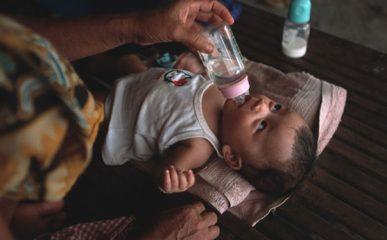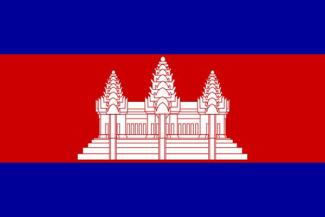Technical Areas
Filter by
Completed/Cancelled activities
Outcome (GPW 13)
Output
Product/Service: Engaging Media in Cambodia to Promote Healthy Diet and Salt Reduction in Phnom Penh and provinces
Technical Area: NCDs & Mental Health
Deliverables: WHO collaborated with the Ministry of Information and the Ministry of Health to promote nationwide salt reduction messaging, through provincial-level dissemination, potentially reaching over 25% of the adult population.
Output
Product/Service: Orientation Workshop of Provincial Focal Points on the Implementation of the National Action Plan for Oral Health 2023-2030
Technical Area: NCDs & Mental Health
Deliverables: In 2024, Cambodia was one of only two countries in the region with a National Oral Health Action Plan. WHO supported the MOH to not only orient provincial focal points on the National Action Plan for Oral Health 2023-2030, but to operationalize the Plan at provincial-level. As a result, provincial focal points identified and conveyed recommendations to address the challenges to implementing the Plan at sub-national level such as ensuring that an essential package of infrastructure and skill for delivery of oral health services is available with an aim to reach all primary health care facilities; and are integrating oral health education into education curricula and including fluoride varnish in routine immunization programs, integrate oral health care services into social protection coverage.
Output
Product/Service: Campaign and policy discussion at national and subnational level to change the norm of alcohol use and development of legislation on Alcohol Control
Technical Area:
Deliverables: Developed and carried out a national campaign and facilitated policy discussion at national and subnational levels to address alcohol use through policy and legislation. Local video clips, banners and posters aiming to shift public perceptions/social norms about alcohol use and to highlight its dangers, were developed through focus group testing and disseminated throughout Phnom Penh and several provinces from October to December 2024 reaching an estimated 25% or more of the adult population in Cambodia. An Inter-Ministerial Working Group for Alcohol Control was formed to support the preliminary discussions for developing legislation on Alcohol Control which would cover the WHO SAFER policy package measures.
Output
Product/Service: Campaign to support the World No Tobacco Day 2024 with the theme "Protecting children from tobacco industry interference" at the provincial level.
Technical Area: NCDs & Mental Health
Deliverables: A national campaign that raised awareness about how the tobacco industry interferes with tobacco control which protects children from the dangers of tobacco was disseminated in 15 of 25 provinces. Multisectoral advocacy events involving WHO resulted in the proposal to have a sub-decree to ban electronic cigarettes, heated tobacco products and shisha to protect youth.
Output
Product/Service: Expanding NCD services at PHC in Mondulkiri province
Technical Area: NCDs & Mental Health
Deliverables: • A total of 30 health center staff from 10 health centers were trained on the national SOP for hypertension and diabetes management in PHC. • NCD services were established at 10 health centers in Mondulkiri province; including EMR application. • A total number of 149 VHSG were trained and gained knowledge on community based NCD education to further strengthen community-based NCD education. • A total number of 936 target population were screened for hypertension, diabetes and CVD risk
Output
Product/Service: Support the development of the Fourth Health Strategic Plan 2024–2033 (HSP4) which provides strategic guidance on health sector development in the next decade
Technical Area: Governance
Deliverables: The Fourth Health Strategic Plan 2024–2033 (HSP4) is finalized and will be released by MOH in March 2025
Output 1.1.5
Product/Service: Support to the Ministry of Health to develop the Health Workforce Development Plan 2024-2033
Technical Area: Service Delivery
Deliverables: The National Health Workforce Development Plan 2024-2033 is completed and endorsed by the Ministry of Health, Cambodia. The final document will be published by Q2 2025
Outcome 1.1 (GPW 13)
Output 1.1.1
Product/Service: COVID UHC Care Pathway
Technical Area: Service Delivery
Deliverables: COVID Care pathway
Output 1.1.1
Product/Service: COVID UHC Laboratory
Technical Area: Service Delivery
Deliverables: COVID UHC Laboratory
Output 1.1.1
Product/Service: COVID UHC health care delivery
Technical Area: Service Delivery
Deliverables: COVID UHC health care delivery
Output 1.1.1
Product/Service: Assessment of bottlenecks to, and potential solutions for, provision of essential care at primary level.
Technical Area: Service Delivery
Deliverables: Scalable, tested models to expand coverage of services, monitor quality, increase community engagement and catalyse service utilization in different settings.
Output 1.1.1
Product/Service: COVID UHC NPI
Technical Area: Service Delivery
Deliverables: COVID UHC NPI
Output 1.1.1
Product/Service: COVID UHC Community engmnt & care pathway
Technical Area: Service Delivery
Deliverables: COVID UHC Community engmnt & care pathway
Output 1.1.1
Product/Service: COVID UHC Strategic communication
Technical Area: Service Delivery
Deliverables: COVID UHC Strategic communication
Output 1.1.1
Product/Service: COVID UHC IMS
Technical Area: Service Delivery
Deliverables: COVID UHC IMS
Output 1.1.1
Product/Service: Strengthening primary care service delivery and community mobilization through PHC Booster Implementation Framework
Technical Area: Service Delivery
Deliverables: • WHO supported the development of the PHC Booster Implementation Framework (PHC-BIF) which was launched in Sept 2023. • Mechanisms to support implementation of PHC-BIF have been formed up at national and sub-national level: National PHC-BIF task force and provincial PHC task force in each of 25 provinces which the later chaired by Provincial Governor and relevant sectors under provincial administrative are members. • Materials and tools used for PHC-BIF orientation, capacity building and situation analysis were developed. • Capacity building of PHC national and provincial facilitators team in each of 25 provinces (in each province: 3 staffs from PHD and 3 from provincial administrative) conducted. • Provincial orientation on implementation and get consensus to move forward with strengthening PHC conducted in all 25 provinces under leadership of provincial governors. • PHC-BIF workplan 2025 were developed by all 25 provinces.
Output 1.1.1
Product/Service: Use of the findings at a subnational and national level, to inform how to scale these approaches
Technical Area: Service Delivery
Deliverables: Operational guidance for key implementation efforts towards UHC
Output 1.1.1
Product/Service: Demonstrate the enhancement of community engagement to increase the demand for services and social accountability in 3 sites
Technical Area: Service Delivery
Deliverables: Scalable, tested models to expand coverage of services, monitor quality, increase community engagement and catalyse service utilization in different settings.
Output 1.1.1
Product/Service: Demonstrate monitoring quality of the delivery of care in 3 sites
Technical Area: Service Delivery
Deliverables: Scalable, tested models to expand coverage of services, monitor quality, increase community engagement and catalyse service utilization in different settings.
Output 1.1.1
Product/Service: Demonstrate the expansion of the coverage of essential services provided in 3 sites
Technical Area: Service Delivery
Deliverables: Scalable, tested models to expand coverage of services, monitor quality, increase community engagement and catalyse service utilization in different settings.
Output 1.1.2
Product/Service: Demonstrate the integration of NCD interventions into primary care in 3 sites
Technical Area: NCDs & Mental Health
Deliverables: Scalable, tested models to expand coverage of services, monitor quality, increase community engagement and catalyse service utilization in different settings.
Outcome 4.1 (GPW 13)
Output
Product/Service: Improve accountability of health providers by monitoring UHC
Technical Area: Information Systems
Deliverables: Agreed upon set of indicators and methods used to monitor UHC efforts at primary care level.
Activity details
Outcome (GPW 13)
Output 1.1.1
Product/Service: Developing evidence-based service packages and clinical guidelines to improve quality of primary health care in Cambodia
Technical Area: Service Delivery
Deliverables: The Complementary Package of Activities (CPA) guidelines act as the essential health services packages to be delivered at three levels of hospitals, while Clinical Practice Guidelines (CPGs) are guide for physicians for appropriate and effective patient care. In 2024, WHO supported the Ministry of Health for revision of CPA and CPG and development of Referral Policy through stakeholder consultations and data collection on care pathway from the ground to make evidence-based policy. The CPA guideline was updated by adding 8 more chapters to the existing 7 chapters based on the gap analysis of current CPA implementation, change of population and service coverage, increased number of hospitals and new clinical services. CPG was reviewed and updated with the new structure and contents aligned with the latest clinical skills and technologies to be available in the country. Two existing CPGs in 2013, CPG for General Medicine for adult, increased from 101 topics to 173 topics and CPG- pediatrics for children increased from 79 topics to 87 topics. Other three new CPGs (Gynecology, Surgery, dentistry) were developed in 2024, while in 2013 no such CPGs. Data collection for care pathway focused on five key prioritized emergency and non-emergency conditions, that is, Polytrauma, Diabetes, Hypertension, Post-partum hemorrhage, Chronic Respiratory Diseases/Chronic Obstructive Pulmonary Diseases to identify the gaps between the guidelines and practices including resource constraints and the areas for improvement and potential investment in the future. CPA and CPG are to be finalized by Q2 2025. WHO will continue to support the development of Referral Policy in 2025, towards the quality care delivered at any health facility through effective referral systems.
Output 1.2.2
Product/Service: Production of national health accounts 2020-2023 to inform health financing policies for UHC
Technical Area: Health Financing
Deliverables: Support the MOH in tracking key health financing indicators to inform critical policy development for UHC, with the aim to finalize and publish the national health accounts report 2020-2023 by end of 2025
Outcome 1.1 (GPW 13)
Output 1.1.1
Product/Service: COVID UHC Op & logistics
Technical Area: Service Delivery
Deliverables: COVID UHC Op & logistics
Output 1.1.1
Product/Service: COVID UHC Surv & risk assessment
Technical Area: Service Delivery
Deliverables: COVID Surv & risk assessment
Output 1.1.5
Product/Service: IPH Support will be provided to the MoH to strengthen health workforce regulation, including direct support to the Health Professional Councils, undertake a labour market analysis, undertake a mid-term review of the Health Workforce Development Plan 2016-2020, and to consider introducing National Health Workforce Accounts
Technical Area: Health Workforce|Working for Health|Service Delivery
Deliverables: WP/DHS/HPS: Technical support for strengthening health workforce regulation, development of sub decree on traditional medicine practitioners, prakas and implementation plan Technical assistance for the conduct of health labor market analysis, modelling, pre-service and in-service training, and migration and other technical support as needed Technical support on the progressive implementation of NHWA HQ/HWF Health Workforce: Technical assistance on health labour market analysis under the Working for Health Programme. IHS: HQ will support through special technical support to promote implementation of WHO Traditional Medicine Strategy through integration into national health system, as requested by RO.
Outcome 1.2 (GPW 13)
Output 1.2.1
Product/Service: Development of basic benefit package
Technical Area: Health Financing
Deliverables: Development of basic benefit package policy
Output 1.2.1
Product/Service: Development of basic benefit package
Technical Area: Health Financing
Deliverables: Service delivery costing and assessment

